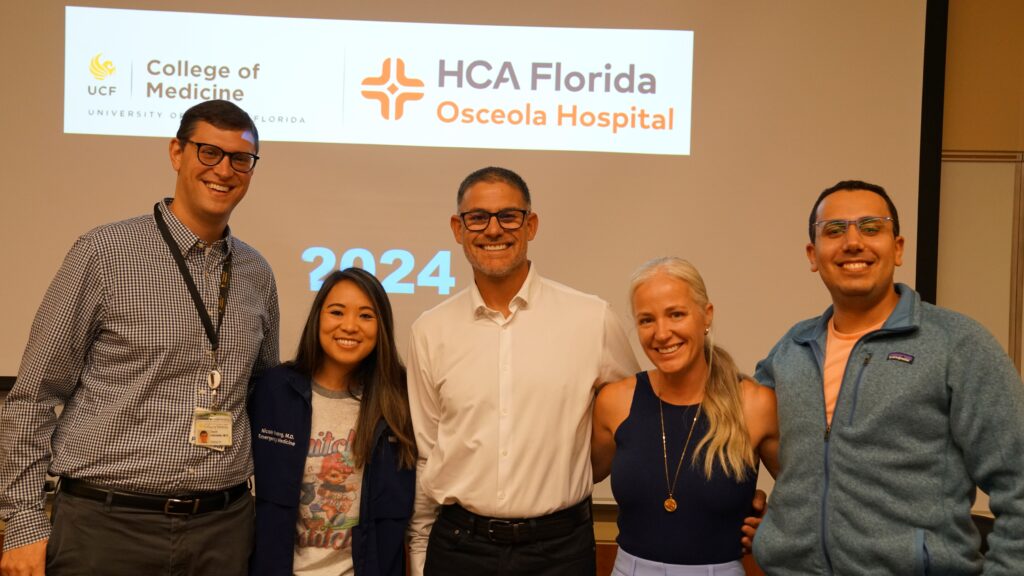
Lauren Brown awoke at 4:30 AM and found her husband, Alex, rocking back and forth on the side of the bed. She asked what he was doing. He couldn’t answer. She saw his face was distorted and drooping and immediately called 911.
Alex Diaz was one of the 795,000 people who suffer a stroke every year, and one of the 13% whose stroke is hemorrhagic, meaning a blood vessel in the brain ruptures. These strokes can cause serious disability and often death. This week a now healthy Diaz and his wife came to the UCF College of Medicine to thank the Emergency Medicine physicians who had saved him.
Paramedics responding to Lauren’s 911 call originally thought Alex’s symptoms were from COVID-19, a diagnosis he had received the day before. But Lauren insisted her husband was having a stroke, so the ambulance transported him to HCA Florida Osceola Hospital, one of 38 HCA Healthcare facilities that partner with UCF to train residents and fellows in one of Florida’s fastest growing graduate medical education programs.
Dr. David Lebowitz leads the Emergency Medicine residency and serves as an associate professor at the medical school. He organized Alex and Lauren’s presentation as an inspirational experience to show residents the impact of their care. He said physician teamwork and Lauren’s persistence made the biggest difference in Alex’s recovery.
“Your insistence led to the EMTs setting off a stroke alert, which had our team properly prepared for his arrival and expedited his care,” Dr. Lebowitz told Lauren during the presentation.
She spoke first to the physicians, describing the emotions of seeing her husband intubated and watching helplessly in the fast-paced environment of the emergency room. She thanked the doctors for explaining to her what they were doing to stabilize her husband and even helping her walk outside when she needed fresh air but was too emotional to move.
After being stabilized, Alex had no function of his right leg and little function of his right arm. Lauren said she began preparing for the fact that her husband might never walk again.
After the residents heard from Lauren, Dr. Lebowitz invited Alex to speak. He entered the College of Medicine auditorium to a standing ovation. He walked assuredly, his legs fully functional and shook Dr. Lebowitz’s hand firmly with the right hand and arm that once could not even lift a spoon 18 months ago.
Alex has no memory of the stroke’s onset and remembers little about his hospital stay except the bacon the hospital served for his meals.
“Maybe the bacon is what helped me heal so well,” he laughed.
After leaving the hospital, Alex began rehabilitation. First, starting on a walker which the physical therapist insisted he did not need after only a few days. Alex and Lauren followed the physical therapist’s program, doing the exercises every night as Alex began to regain full use of his body. Before long, he was able to walk and use his right arm again.
“Physical therapy was easier than I expected, but the brain-related side was more difficult,” he said.
He recalled taking mental exams and thinking he had done well before getting his results and realizing his short-term memory had been severely affected. He worked extensively with a neurotherapist who specializes in executive functioning, such as planning, problem solving and adaptation and has recovered tremendously. While he still has difficulties with short term memory, it has drastically improved.
Today, Alex has been back at work for over a year. He is grateful to the paramedics who brought him to the hospital and the HCA Florida Osceola Hospital physicians who cared for him and to his wife. Alex thanked the doctors for fighting for him during every part of his healthcare journey.
“I think about that night every single day and what could’ve been if not for my wife and the doctors that took care of me,” he said.
This presentation was part of a retreat to remind Emergency Medicine physicians and residents that while they respond to countless accidents and illnesses, there are individuals and families behind each case.